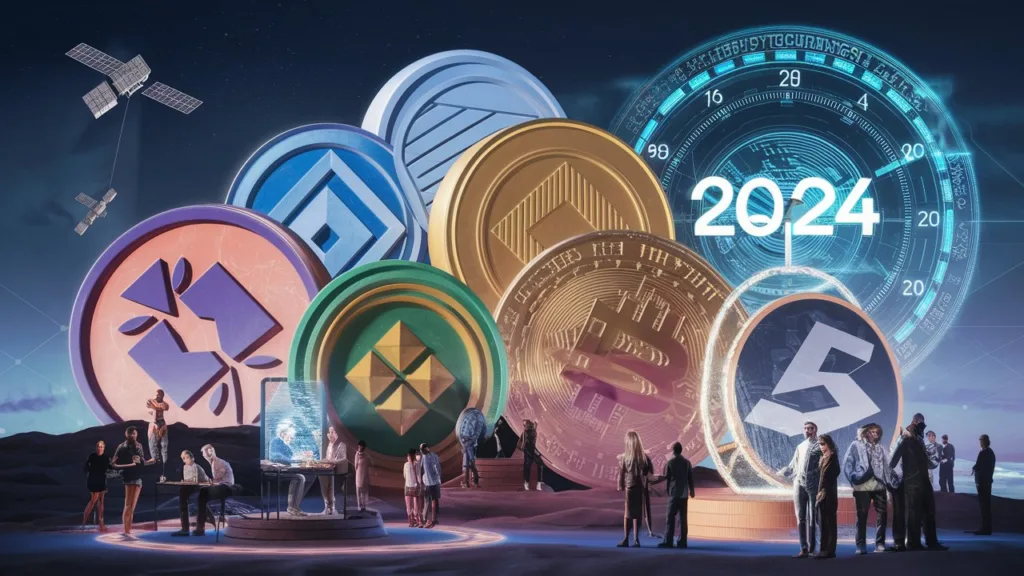The world of finance has been shaken by the emergence of cryptocurrencies, with Bitcoin leading the charge since its creation in 2009. But what exactly are these digital currencies, and how do they work? This article dives into Bitcoin and cryptocurrencies in 2024, explaining them in a clear and concise way for beginners.

What are Cryptocurrencies?
Cryptocurrencies are essentially digital cash that utilizes cryptography for security. This makes them difficult to counterfeit, unlike traditional currencies. Unlike traditional currencies controlled by governments or financial institutions, cryptocurrencies rely on a technology called blockchain.
What is Blockchain?
Imagine a powerful ledger that records all transactions within a network of computers. Each transaction is placed in a “block,” and these blocks are chained together, forming a “blockchain.” This system is incredibly secure. Once a transaction is recorded, it cannot be changed, ensuring stability and trust within the system.

Bitcoin: The Digital Gold Standard
Bitcoin is the first and most famous cryptocurrency. Its creator, known only by the pseudonym Satoshi Nakamoto, developed it in 2009. Often referred to as “digital gold,” Bitcoin is scarce and valuable, just like its precious metal counterpart. There will only ever be 21 million Bitcoins in existence. This limited supply is one reason why Bitcoin is considered valuable. People invest in Bitcoin hoping its price will appreciate over time.
How Does Bitcoin Work?
Bitcoin transactions are broadcast across a network and verified through cryptography. These transactions are then recorded on the blockchain. When you send Bitcoin, the transaction is broadcasted to the entire network. Miners, who are special participants on the network, confirm the transactions by solving complex mathematical problems. This process is called mining. Miners are rewarded with new Bitcoins for their work. Mining also ensures that the network remains stable and that transactions are processed correctly.

Using Bitcoin is Easier Than You Think
Getting started with Bitcoin is relatively simple. You’ll need a digital wallet to store your Bitcoins. This wallet has a unique address that you use to send and receive Bitcoins. To purchase something with Bitcoin, you simply enter the recipient’s address and the amount of Bitcoin you want to send. The transaction is then processed by miners and added to the blockchain. This process typically takes a few minutes.
Beyond Bitcoin: A World of Cryptocurrencies
While Bitcoin is the most well-known cryptocurrency, there are many others available. Here are a few of the most popular ones in Bitcoin & Cryptocurrencies in 2024:
- Ethereum (ETH): Known for its smart contracts feature, which allows for automatic execution upon meeting certain conditions.
- Ripple (XRP): Focused on facilitating real-time global payments, used by many banks and financial institutions.
- Litecoin (LTC): Created to be the “silver” to Bitcoin’s “gold,” offering faster transaction times and lower fees.
- Bitcoin Cash (BCH): A fork of Bitcoin designed to enable faster transactions, addressing some of Bitcoin’s scalability issues.
- Cardano (ADA): Emphasizes security and sustainability within its blockchain, aiming to create a more balanced and eco-friendly environment.
How to Buy and Store Your Cryptocurrencies
Several online platforms called exchanges allow you to buy cryptocurrencies. Popular options include Coinbase, Binance, and Kraken. These platforms facilitate the exchange of traditional currency for cryptocurrencies. Once you’ve purchased your crypto, you’ll need to store it securely in a digital wallet. There are two main wallet types:
- Hot Wallets: These are online wallets, convenient but less secure due to their internet connection.
- Cold Wallets: These are offline wallets, offering greater security but reduced accessibility due to their lack of internet connection. Examples include hardware wallets and paper wallets.
The Many Uses of Cryptocurrencies
Cryptocurrencies offer a variety of use cases in Bitcoin & Cryptocurrencies in 2024:
- Investment: Many people buy cryptocurrencies hoping their value will increase. Some view them as long-term investments, while others engage in trading for short-term gains.
- Payments: Some businesses accept cryptocurrencies as payment for goods and services, both online and offline.
- Remittances: Cryptocurrencies enable fast and cost-effective cross-border money transfers, particularly beneficial in countries with high remittance fees.
- Smart Contracts: Platforms like Ethereum allow for the creation of smart contracts, self-executing contracts with terms written directly into code. This can automate complex processes and reduce the need for intermediaries.
The Advantages of Cryptocurrencies
Cryptocurrencies offer several advantages:
- Decentralization: No single entity controls cryptocurrencies, reducing the risk of corruption and manipulation. This also makes the system more resilient to failure.
- Security: Cryptographic techniques ensure secure transactions. Public and private keys guarantee that only the intended recipient can access the funds. Lower Fees: Transaction fees are generally lower compared to traditional financial institutions, especially for international transactions. Accessibility: Anyone with an internet connection can access cryptocurrencies, including people in remote or underserved areas.
The Risks of Cryptocurrencies
While promising, Bitcoin & Cryptocurrencies in 2024 also come with inherent risks:
- Volatility: Cryptocurrency prices can be highly volatile, meaning they can fluctuate significantly. This makes them unstable investments.
- Regulation: Governments may impose regulations that could impact cryptocurrency prices and usage. These regulations can vary greatly from country to country.
- Security: Despite their security features, cryptocurrencies can still be hacked. Users need to be vigilant about protecting their wallets and private keys. Incidents of exchange hacks have resulted in substantial losses.
- Limited Acceptance: Not all businesses accept cryptocurrencies as payment. This limits their usability in everyday transactions.
The Future of Bitcoin & Cryptocurrencies
The future of cryptocurrencies remains uncertain, but it holds promise. More and more businesses and individuals are starting to embrace them. Governments are also exploring the potential of cryptocurrencies and blockchain technology. Central banks are even considering issuing their own digital currencies. As technology advances, we can expect to see even more innovative uses for cryptocurrencies, potentially integrating them with cutting-edge technologies like the Internet of Things (IoT) and Artificial Intelligence (AI).
Conclusion
Bitcoin and other cryptocurrencies have undeniably transformed the financial landscape. They offer a new way to think about money and transactions. While there are risks involved, the potential benefits are undeniable. By understanding how Bitcoin & Cryptocurrencies in 2024 work, you can make informed decisions about whether to invest in or use them. As the world becomes increasingly digital, the role of cryptocurrencies is likely to continue to evolve. Whether you’re an investor, a tech enthusiast, or simply curious about the future of finance, it’s definitely worth keeping an eye on this exciting and ever-changing field.


